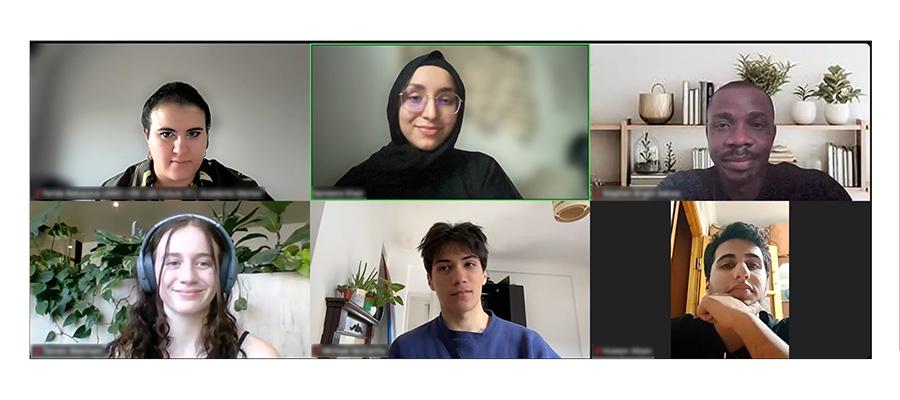- About
- Admissions
- Study at AUS
- Prospective Students
- Bachelor's Degrees
- Master's Degrees
- Doctoral Degrees
- Admission Publications
- International Students
- Contact Admissions
- Grants and Scholarships
- Sponsorship Liaison Services
- Testing Center
- New Undergraduate Student Guide
- Undergraduate Orientation
- New Graduate Student Guide
- Graduate Orientation
- File Completion
- Payment Guide
- Students with Disabilities
- Executive and Continuing Education
- Academics
- Life at AUS
- Research
- Publications
- Contact Us
- Apply Now
- .

Learning without borders: AUS students collaborate across continents as part of QS Future17’s SDG Challenge
Now in its fifth semester, the program has brought together more than 85 AUS students with hundreds of peers from other world-class universities to tackle pressing sustainability challenges
When students from American University of Sharjah (AUS) logged on to meet their new teammates for the QS Future17 Sustainable Development Goals Challenge, their screens filled with faces from every corner of the world. Engineering majors, design students and environmental scientists from countries such as Singapore, Brazil and South Africa came together to spend the semester working across borders, time zones and disciplines to find practical solutions to some of the world’s most pressing sustainability challenges.
The initiative, co-founded by QS Quacquarelli Symonds and the University of Exeter, connects students from 13 universities across 12 countries to apply what they learn in the classroom to pressing sustainability issues aligned with the United Nations Sustainable Development Goals. It offers students an international learning experience designed to help those interested in sustainability to think critically, work collaboratively, and lead responsibly.
In the 2025 cycle, AUS students joined more than 400 peers worldwide to address topics such as food security in Singapore, inequality in Brazil, wildfire management in the United States and climate action in Cameroon. Mentored by AUS faculty and supported by the AUS Office of Sustainability, they collaborated with counterparts from world-class universities, such as the University of Exeter, Stellenbosch University, the University of São Paulo and the American University in Cairo.
“The motivation behind joining the Future17 Challenge was to give our students a transformational learning experience that contributes meaningfully to sustainable development,” said Dr. James Griffin, Vice Provost for Undergraduate Affairs and Instruction and academic lead for the program at AUS. “They gain experience in teamwork, leadership, intercultural communication, project management and time management—all skills that prepare them to lead positive change in their communities. Driving real change in sustainability is no walk in the park, but that’s exactly what makes this challenge worthwhile. It pushes students to move from ideas to action and see what level of effort it really takes to create meaningful impact in the world.”
AUS students have worked with a range of international organizations through the program. One team partnered with T-Hues in Sri Lanka, developing a framework to ensure ethical sourcing and sustainability in natural dye production. Another collaborated with Briink Intelligence GmbH in Germany on AI-driven tools for more accurate environmental, social and governance (ESG) reporting. AUS students have also worked with the Eco-Friendly Web Alliance in the United Kingdom to promote sustainable digital device use, and with QS ImpACT in the Democratic Republic of Congo to support education programs for out-of-school youth.
“As a sustainability leader and a Future17 mentor, I’ve seen how the program builds important bridges between universities, industries and local communities,” said Julia Carlow, Associate Head of Sustainability at AUS. “It connects our students and faculty to a global ecosystem of sustainability learning and practice. This kind of collaboration reflects AUS’ commitment to building multi-sector, international partnerships that advance sustainability education, research, and innovation.”
Since its launch in 2022, the Future17 Challenge has connected over 85 AUS students with hundreds of students, faculty and sustainability experts across institutions to co-create research-based responses to environmental and social issues. Each project is supported by academic mentors and industry experts, helping students develop skills in global teamwork and intercultural collaboration while applying their learning to complex, real-world sustainability contexts.
“The founding partners, QS and the University of Exeter, have been instrumental to the program’s success,” said Dr. Griffin. “In addition to coordinating this sizable program, QS provides the connections that link students with global partners, while the University of Exeter oversees the academic framework that makes the experience rigorous and rewarding for our students.”
For AUS, participation in Future17 builds on its existing recognition as a sustainability leader in the higher education sector in the UAE. AUS has a STARS Gold Institution ratng by the Association for the Advancement of Sustainability in Higher Education (AASHE), reflecting the university’s strong performance in sustainability education, operations and community engagement. It also reinforces AUS’ mission to prepare students to lead in the emerging green economy and to contribute to global progress through research, education and community engagement.
Along with programs such as the Transformative Sustainability Project (TSP) and the long-running EcoReps program, AUS continues to cement its position as a regional hub for sustainability education and action that prepares students to lead with vision, passion and purpose.
For more information about sustainability at AUS, visit www.aus.edu/sustainability.

